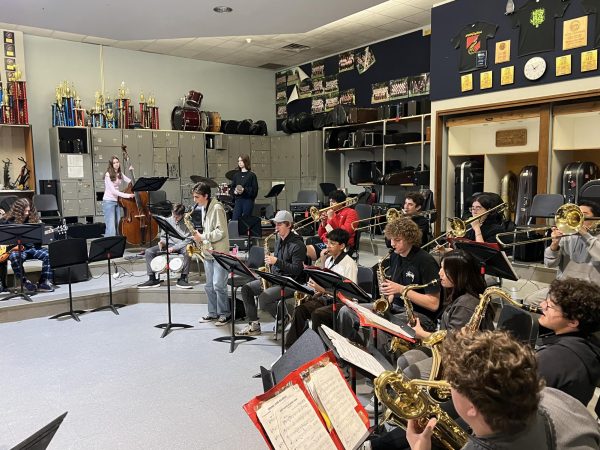Choosing a language? Northgate’s shrinking selection leaves much to be desired
The Sentinel’s Vivian Tanforan, who studies French, and Gabriella Toranski, who studies Spanish, offer perspective on the need for varied language study opportunity
“As much as languages should not have to compete with each other to get a spot considered coveted on the course list, high schools are set up to do just that. While we cannot have every language taught, it is without a doubt necessary to expand our selection.” – Vivian Tanforan and Gabriella Toranski
One of the most appreciated benefits of high school – choosing one’s courses – can be considered a rite of passage. The decision of what to learn is a stark change from the rigid structure of elementary and middle school, a symbol of newfound freedom.
Northgate offers a multitude of classes, ranging from Advanced Art to Zoology. By enabling teenagers to make decisions for themselves, they are able to learn valuable skills to use throughout their careers. As the world becomes more accessible and international job offers soar, students will eventually find themselves needing to learn another language.
Schools should and must be able to fill this void, but Northgate has missed the mark. When Northgate disregards the importance of languages, students become deprived of the ability to pick their courses—and their futures.
Though Northgate is not the only school afflicted by the plague of mishandled monetary matters throughout the American education system, its learning environment has been hit particularly hard in this respect. Recently, Northgate has moved forward in disbanding the French program.
Last summer, students were informed via email that the French department was to be shut down. A statement from Principal Kelly Cooper declared, “we are collapsing our French program,” though the reasoning behind this decision was cryptic, simply stating it was “due to a number of circumstances.” French I, French Honors, and AP French were terminated from the course list, preventing new students from immersing themselves in the language and culture.
The school decided to offer French II and III, allowing students to complete their UC/CSU World Language requirements. However, more advanced students remained unable to delve deeper into their studies. Solutions for those wanting more difficult courses were given little direction, only recommending an online “list of resources and programs to explore.”
Though it is unknown specifically why the beginning and advanced French classes disappeared from the course list, teachers and administrators have said it is because of fewer students taking the courses. Compared to the booming Spanish program, class sizes in French were dwindling, potentially due to the nature of the language.
Naturally, there is less incentive for an American high schooler to learn a language with limited everyday usage. In the minds of Americans, French is portrayed as a romantic and beautiful language, but one that is infrequently used. Outside of small French-speaking communities like historically French Louisiana, it is not commonly spoken in the U.S. Because of this, the French language holds a unique but tenuous place in American schools.
29 countries consider French official language
Despite the current state of French usage nationwide, the future could point the language towards a different direction. Business publication Forbes predicts that a whopping 750 million people will speak French by 2050. Furthermore, Forbes explains that Natxis, an investment bank, believes “French could be the most-spoken language in the world, ahead of English and even Mandarin.” In fact, today 29 countries consider French to be their official language, and according to Babbel, that puts French right behind English.
However, that’s not the entire story, at least not for Northgate. German, one of the two languages offered in full, is closer to French in its limited use. While both languages have a rich cultural history stretching back centuries, neither are exactly popular today. According to Statistical Atlas, 0.4% of Californians are French speakers, and German trails behind slightly with 0.3% speaking it.
German is also less commonly spoken globally, with 132 million speakers to French’s 220 million. World Atlas states that about 95 million people consider German to be their mother tongue, and the language is secondary to around 10 million. It is the official language of a handful of European countries, including Germany, Switzerland, and Austria, according to language education organization Babbel.
German program “always in danger”
Nancy Grabow, more commonly known as Frau Nancy, is the sole German teacher at Northgate.
She expresses her love for the job and the language, but admits that her “little German program is always in danger of cancellation because of low enrollment.” The convenience of Spanish may be responsible for this.
“It is easier for Spanish learners to practice Spanish in the ‘real world’ because there is readily-available Spanish radio and TV, there are Spanish speakers in the community with whom they can practice. It is harder for us in German,” Frau Nancy explained. And data supports her statement: 25.8% of Californians speaking Spanish, according to Census Scope.
Collapse of middle school classes
Another major impact to the French program was the collapse of middle school courses that feed into Northgate.
Francisco Tubio, the World Language Department chair, explained when asked that “the fact that Foothill stopped offering French also hurt the program at Northgate.”
After 2018, Foothill Middle School ceased to offer beginning French classes. Out of all the Mt. Diablo Unified School District middle schools, an online course search shows that only Sequoia Middle School in Pleasant Hill offers students the options for German, French and Spanish. The rest – Foothill, Oak Grove, Pine Hollow and Diablo View – offer only Spanish.
From a global perspective, it is no surprise that Spanish has eclipsed French and German at Northgate. Babbel states that Spanish is the second most spoken language in the world, consisting of over 460 million native speakers from Guatemala to Spain and beyond. Furthermore, over a quarter of California’s population speaks Spanish. Hispanic communities make up a large part of the state, as well as Northgate’s student body. By learning Spanish, students can ensure that they will have ample practice for their language in the future.
That said, all three languages are equally deserving of a place in the curriculum. French has speakers across the world, German has a rich history, and Spanish has a major audience within the United States.
One language cannot be prioritized over the other. It is unfair to the students who have their minds set on a language that interests and stimulates enrichment. It is unfair to the languages that have survived hundreds of years of turmoil, revolution, change, expansion, and decline. America is a diverse country with a multitude of languages, cultures, and traditions, and our school system must reflect that to the best of its ability. To throw away the ability to learn these languages is to make our country a homogenous and generic place. The complexity of our country should not be gambled on, but instead deserves to be treated with caution.
Culture is an important part of not only every country and language, but of every curriculum as well. Frau Nancy believes that “if [students] know or learn about the culture, they will be excited about going to a German speaking country and using their language in an authentic setting,” which encourages her to engage her students in important events such as “Oktoberfest, Day of German Unity, baking waffles… singing Christmas carols in German, St. Nickolas Day… [and] attending the Berlin and Beyond film Festival in SF every year.”
This idea of celebrating culture along with language rings true for all languages. With a language comes the need to educate on its background and culture.
“As Americans we have a responsibility to realize that other cultures and other languages are important,” Frau Nancy added.
But how is this possible when there is such a limited selection at Northgate?
The school offers numerous variations of English, including AP Language, AP Literature, Threads, and electives focusing on its structure. We must allow foreign languages to receive similar respect and spotlight.
Maintaining and expanding the languages we already offer is the first step to a culturally enriching language department at Northgate. Beyond that, the possibilities are endless for other languages to enter the curriculum. The world is constantly changing, and our curriculum should change alongside it.
Northgate piloted Mandarin
At one point, Northgate’s world language department was quite large. With the inclusion of Mandarin, a total of four options were available at the school.
Tubio, who teaches Honors and AP Spanish, recalled that “in 2010, Northgate started piloting Mandarin,” becoming the first school in the district to offer the course. Unfortunately, issues holding down a teacher for the Mandarin classes led the program to face the same fate as French. Tubio remarked that he “really fought hard for [its inclusion] as Mandarin would be a non-European language and [the World Language department] could offer more diversity.”
Mandarin is a language of explosive popularity, with a greater audience than both French and German combined. Babbel states that 1.117 billion people on Earth speak Mandarin, ranking it second below English. As China’s economy and power continue to grow, we can only expect Mandarin to grow in turn.
According to Babbel, Mandarin is the most difficult language for a non-native speaker to learn. While that may seem like a reasonable concern as to why it is not taught at Northgate, it still feels forced rather than formulated to leave it out of our curriculum.
Northgate allows students to take up to six AP classes over their four years of high school and offers some of the most difficult ones on the College Board, including AP Chemistry, US History, and Government. In addition to that, concurrent enrollment with DVC is allowed for students who wish to go the extra mile. Why should a language be treated differently?
With the elimination of not only AP and honors courses for French, but also the unit entirely, it seems as though the school is discouraging rigor for students in the language department. Reviving Mandarin would not replace the learning environment of French, but it would offer another course option and would encourage challenging academic skills in the language department.
In fact, pushing oneself to learn a particularly difficult language can be just as useful as a demanding AP class. Frau Nancy supports the learning of languages in classrooms, citing its benefits on students. She says, “learning a language is a challenging, academic task… the rigor of daily language practice needed when learning a foreign language this late in life… is good for students: it can encourage good study habits and give students a great feeling of accomplishment when they can actually use the language they’ve [been] learning in classroom activities or in actual situations.”
If learning a language can not only benefit a student’s academic skills in other classes, but also teach them to become more handy in real life, why is the language department put on the back burner? Frau Nancy hits the issue on the nose, explaining that students “will be most successful if they can take a language they want to take: we all know that learning a language is a lot of work: why would you want to invest all that work in learning a language you’re only semi-interested in?”
Although Frau Nancy would love “to see Spanish, French, and German, as well as Latin, perhaps Chinese – Mandarin, presumably – and maybe even Italian offered,” she stated that “with the way our schools are structured, looking at required classes and elective units and the number of hours of instruction, it is unrealistic to think a school could offer all those languages, because the total number of students would be spread out among so many languages and levels each class could potentially have 10 or fewer students, and as a public school with limited funds, this is not feasible.”
Languages should not have to compete
As much as languages should not have to compete with each other to get a spot considered coveted on the course list, high schools are set up to do just that. While we cannot have every language taught, it is without a doubt necessary to expand our selection. Once the class of 2023 completes their world language requirements, Northgate will only offer two languages. Even so, it seems as though we may be limited to just one—Spanish.
It is up to us to see that the World Language offerings remain centered equally on mother earth’s many mother tongues. As Department Chair Francisco Tubio said, the key to a wider selection is to “have more students signing up for these languages.” Northgate is open to change, and “the department and the school have already demonstrated several times that we can adapt to almost anything,” stated Tubio.
Students need and deserve an introduction to languages, starting in middle school and continuing into high school. For students willing to stride towards excellence on their academic journey, we must consider enriching ourselves and stepping outside of our comfort zone. By choosing to learn a less popular world language at Northgate, we will pave a path towards greater opportunities for both the language department and future students.











Claire O'Brien • Jun 1, 2021 at 2:46 pm
Really great article!
adviser • Sep 20, 2021 at 8:51 pm
The Sentinel staff thanks you for reading this and for your comment.